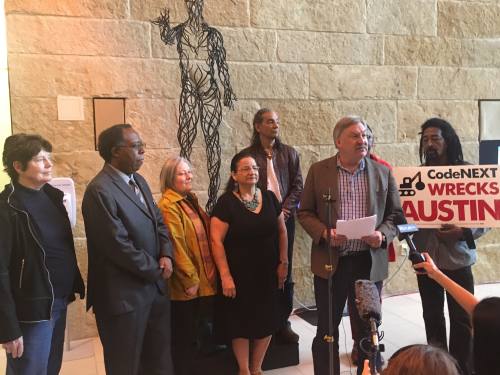A petition allegedly containing over 32,000 signatures submitted to the city clerk on Thursday could put CodeNEXT—the city’s land development code rewrite—to a public vote and has raised questions about equity in the city’s decision-making process.
Elected officials have called the code rewrite necessary to allow Austin to manage its accelerating population growth, but CodeNEXT has received constant criticism from across the political spectrum during the ongoing, five-year, $8.5 million process.
A
land development code lays out the regulatory blueprint for how land can be used and built upon in a city. It informs property owners of what they can and cannot do on their property.
The months-long grassroots campaign to give citizens, rather than council members, voting power on the product was led by the political action committee Let Us Vote Austin and IndyAustin. It received support from groups like the Austin Neighborhoods Council and the local chapter of the National Association for the Advancement of Colored People.
“I don’t care whether you like CodeNEXT…we’re here today to say that people have the right to vote on it,” Fred Lewis, Let Us Vote Austin’s treasurer, said during a press conference Thursday. “CodeNEXT affects everyone’s life in this city…everyone’s property. The people have a right to decide the fate of their future.”
Questions raised over equity
CodeNEXT,
currently in its third draft, is under review by the city’s land use commissions. The commissions will recommend changes to the 1,500-page document for City Council to consider. City Council expects to take a final vote by August of this year.
Supporters of the petition say their motivation is that residents, not city council members, should vote on policy guaranteed to affect every citizen’s property.
“We can’t trust politicians, we trust people, this is democracy,” Nelson Linder, president of the Austin chapter of the NAACP, said on Thursday. “It’s one vote about our future. We are convinced that democracy, when it’s inclusive, makes the best decisions.”
Susana Almanza is from east Austin, an area that has been historically disenfranchised. She said allowing the people to vote on the product would give east Austinites a bigger voice and ensure equity.
However, Austin Mayor Steve Adler said inequity concerned him most with the petition.
Adler said a city-wide vote would be a step backward from the progress the city made four years ago by switching to district-based city council representation, also known in Austin as the 10-1 form of government—10 district-elected council members and one city-elected mayor.
“The purpose [of switching to 10-1] was that all parts of our city would have an equal opportunity to impact the policies and the direction of this city,” Adler said on Thursday. “Before we passed 10-1, only those areas of the city that had the greatest turnout were really controlling what happened in this city.”
Allowing a city-wide vote, Adler said, would give the loudest voice to the parts of the city with the greatest voter turnout. Leaving the vote with the elected council members would ensure each part of the city was represented equally.
According to a report produced by Austin Community College’s Center for Public Policy and Political Studies, turnout in 2014—the last non-presidential November election—heavily favored voters west Austin districts over those primarily located east of IH-35.
Districts 1 through 4 cast 40,244 votes—an average of roughly 10,000 votes per district—compared to the 126,083 votes cast in districts 5 through 10—roughly 21,000 votes per district. Through 10-1, each district is represented equally with one vote.
However, Almanza said the petition represents the two sides of town working together.
“This rewrite doesn’t just affect East Austin, it impacts all of Austin,” Almanza said. “It’s about all the neighborhoods working together … and understanding that there is a lack of equity.”
The process ahead
The petition attempts to initiate legislation to allow Austinites to vote on any future comprehensive rewrite of the land development code.
Questions remain whether state law permits citizens to enact legislation on zoning. Should the petition be deemed sufficient, City Council could enact the legislation, or put it to an election, which would need to be set by the Aug. 20 deadline.
Voters would then decide in November whether residents should have the power to vote on a comprehensive rewrite of the city’s land development code.
According to Lewis, if that legislation is approved in November, it would stay any prior City Council adoption of CodeNEXT, with a final vote from the public on the land development code arriving at the earliest in November 2019.
The city would continue to operate under the current code in the meantime.
Bryce Bencivengo, spokesperson for the city of Austin, said, for now, the city is just focused on ensuring the validity of the petition.





